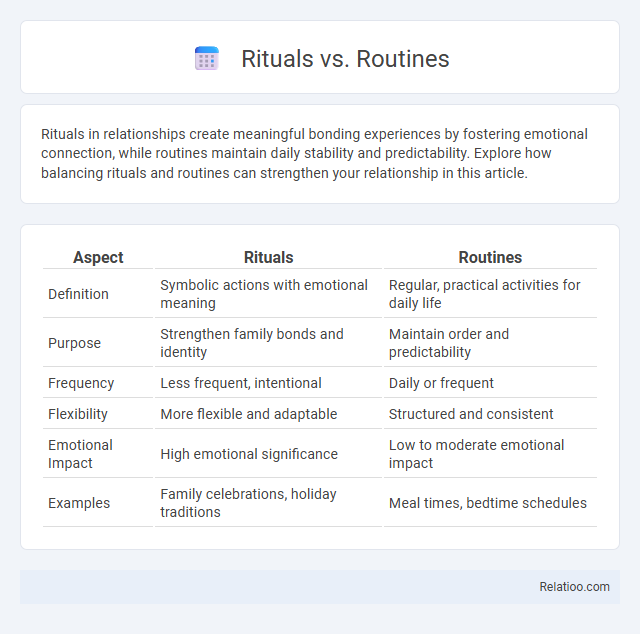Rituals in relationships create meaningful bonding experiences by fostering emotional connection, while routines maintain daily stability and predictability. Explore how balancing rituals and routines can strengthen your relationship in this article.
Table of Comparison
| Aspect | Rituals | Routines |
|---|---|---|
| Definition | Symbolic actions with emotional meaning | Regular, practical activities for daily life |
| Purpose | Strengthen family bonds and identity | Maintain order and predictability |
| Frequency | Less frequent, intentional | Daily or frequent |
| Flexibility | More flexible and adaptable | Structured and consistent |
| Emotional Impact | High emotional significance | Low to moderate emotional impact |
| Examples | Family celebrations, holiday traditions | Meal times, bedtime schedules |
Understanding Rituals and Routines
Rituals are symbolic actions with deep personal or cultural meaning that foster mindfulness and emotional connection, whereas routines are repetitive tasks performed primarily for efficiency and habit. Understanding rituals involves recognizing their role in creating intention and significance in your daily life, while routines serve to streamline activities without necessarily invoking emotional engagement. Your awareness of these distinctions enables you to intentionally integrate rituals that promote well-being alongside efficient routines.
The Psychology Behind Rituals
The psychology behind rituals reveals their power to create meaning and emotional connection, unlike routines, which are primarily practical and repetitive tasks. Rituals engage the brain's reward system, boosting feelings of control and reducing anxiety by marking transitions or significant moments in life. By incorporating rituals into Your daily life, You can enhance mindfulness, foster emotional well-being, and strengthen social bonds beyond the efficiency of mere routines.
The Science of Routines
The science of routines reveals that structured behaviors enhance cognitive efficiency and reduce decision fatigue by automating daily tasks. Rituals differ by embedding symbolic meaning and emotional engagement, which can increase motivation and psychological well-being. Understanding these distinctions helps optimize personal habits for improved mental health and productivity outcomes.
Key Differences Between Rituals and Routines
Rituals differ from routines primarily in their symbolic meaning and emotional impact, as rituals are intentional actions imbued with significance, often linked to cultural or personal beliefs, while routines are habitual behaviors aimed at efficiency without deeper meaning. Routines focus on consistency and productivity in daily tasks, whereas rituals foster mindfulness, connection, and a sense of purpose. The key differences lie in the deliberate focus on meaning and experience in rituals compared to the functional, repetitive nature of routines.
The Role of Intention in Rituals and Routines
Intent plays a crucial role in distinguishing rituals from routines, as rituals are intentional actions imbued with symbolic meaning, whereas routines are habitual behaviors performed with little conscious thought. Rituals often involve mindfulness and purpose that enhance emotional and psychological well-being, while routines primarily focus on efficiency and task completion. The deliberate intention behind rituals fosters connection and significance, transforming ordinary activities into meaningful experiences.
Benefits of Embracing Rituals
Embracing rituals enhances your mental well-being by creating meaningful patterns that promote mindfulness and reduce stress, unlike mere routines that often lack emotional significance. Rituals cultivate a deeper connection to your intentions and surroundings, fostering a sense of purpose and stability in daily life. This intentional practice supports personal growth by reinforcing positive habits and improving focus, making rituals a powerful tool for lasting transformation.
Advantages of Building Routines
Building routines enhances productivity by creating consistent, automatic behaviors that reduce decision fatigue and increase efficiency. Routines promote mental clarity and reduce stress by establishing predictable patterns that support goal achievement and healthy habits. Integrating structured routines into daily life improves time management and fosters long-term personal and professional growth.
How Rituals and Routines Impact Daily Life
Rituals create meaningful patterns that foster mindfulness and emotional well-being, enhancing your daily experience with intentional actions that go beyond mere habit. Routines provide structure and efficiency, helping your day run smoothly by automating essential tasks and reducing decision fatigue. Balancing rituals and routines improves productivity while enriching your life with purpose and stability.
Integrating Rituals and Routines for Greater Well-being
Integrating rituals and routines leverages the structured consistency of routines with the meaningful symbolism of rituals to enhance overall well-being. Routines provide stability and efficiency through repetitive actions, while rituals infuse these actions with intentionality and emotional significance, fostering mindfulness and connection. Combining both creates a balanced lifestyle that supports mental health, reduces stress, and cultivates a deeper sense of purpose.
Choosing What Works: Personalizing Your Practice
Choosing what works best for your daily habits involves understanding the subtle differences between rituals, routines, and a ritual. Routines are automated sequences of actions designed for efficiency, while rituals carry symbolic meaning and emotional significance, offering mindfulness and purpose. Personalizing your practice means blending routines with meaningful rituals to create a balanced approach that supports your wellness, productivity, and self-awareness.

Infographic: Rituals vs Routines
 relatioo.com
relatioo.com